Unit 12 第1课时(Section A 1a-1c) (同步课件)-七年级英语下册同步精品课堂(人教版)
文档属性
| 名称 | Unit 12 第1课时(Section A 1a-1c) (同步课件)-七年级英语下册同步精品课堂(人教版) |

|
|
| 格式 | pptx | ||
| 文件大小 | 15.3MB | ||
| 资源类型 | 试卷 | ||
| 版本资源 | 人教新目标(Go for it)版 | ||
| 科目 | 英语 | ||
| 更新时间 | 2024-04-14 12:05:27 | ||
图片预览

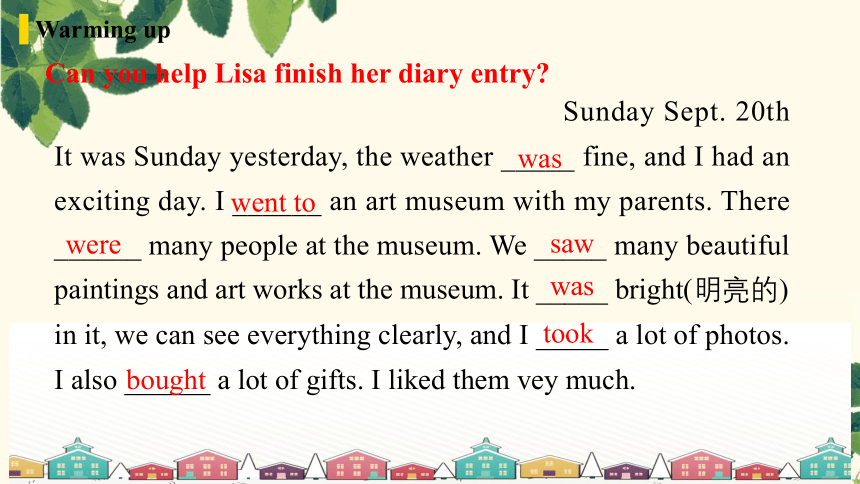

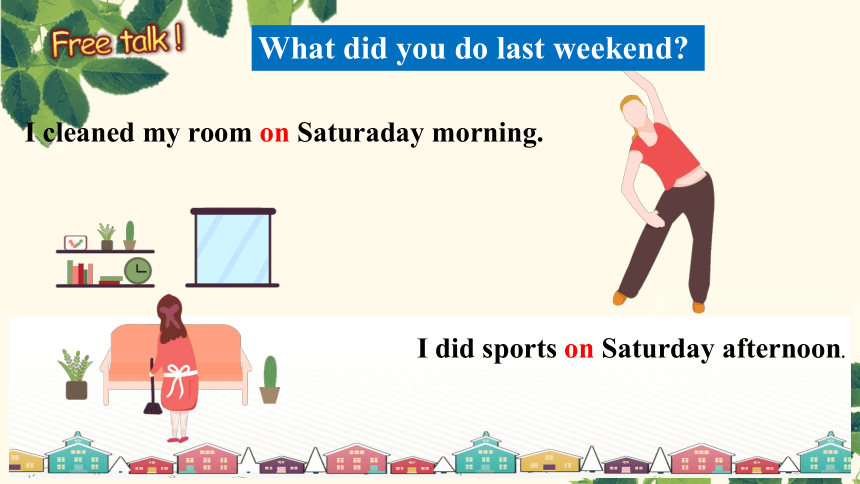
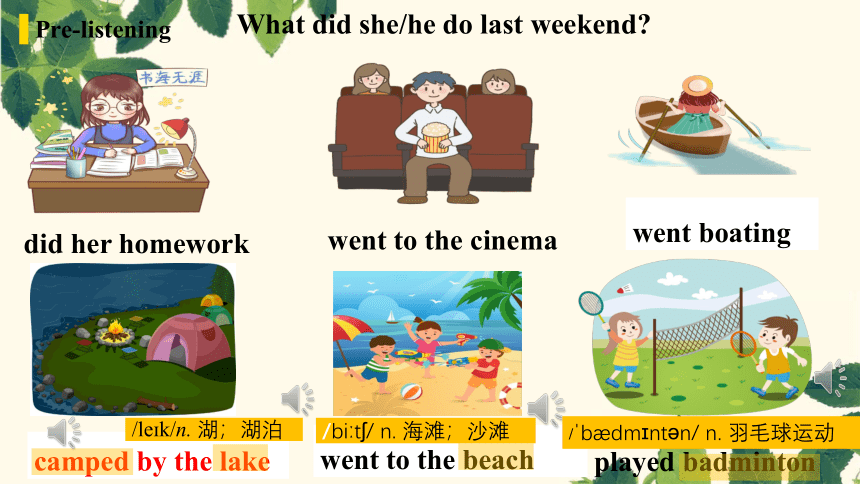

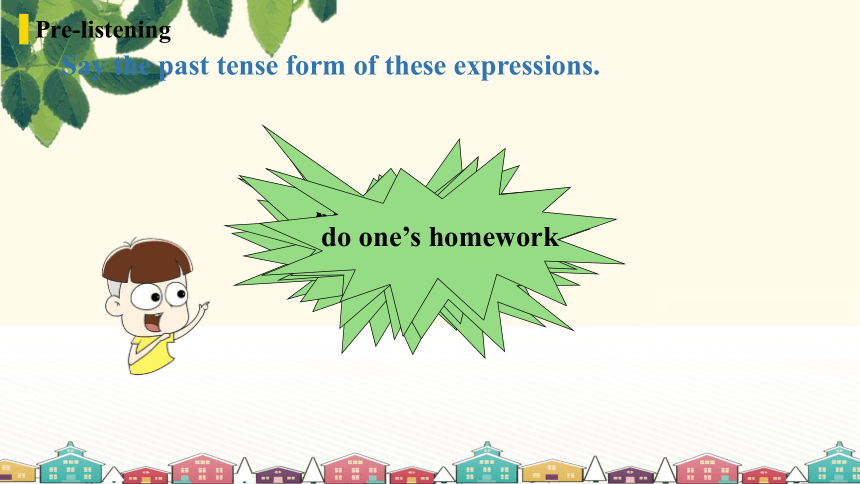
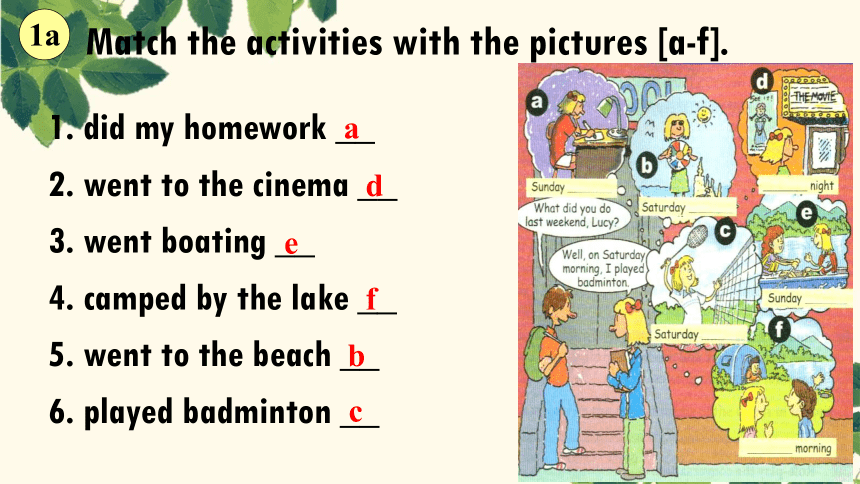
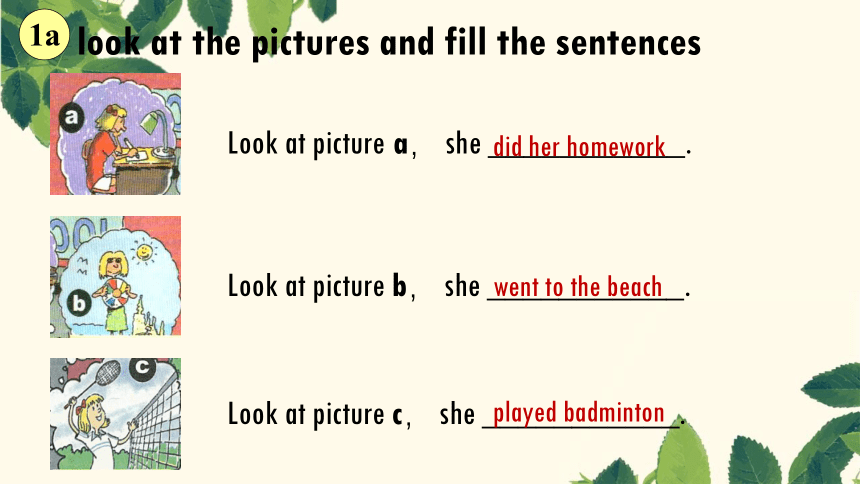
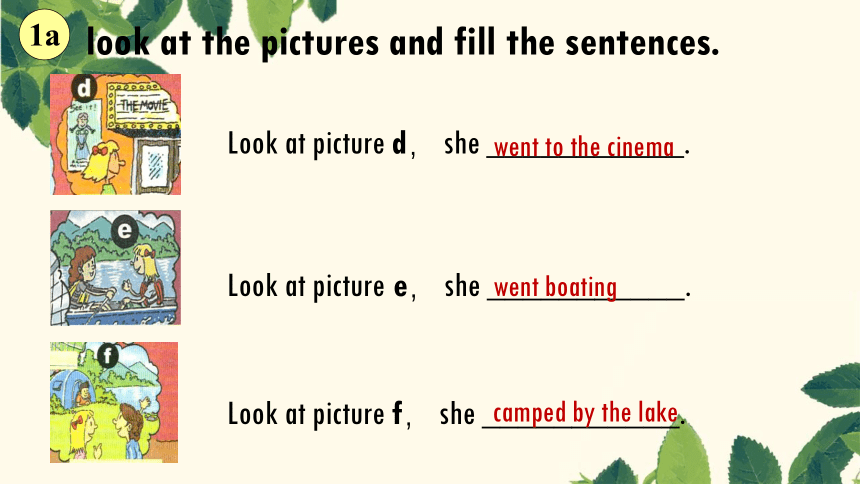
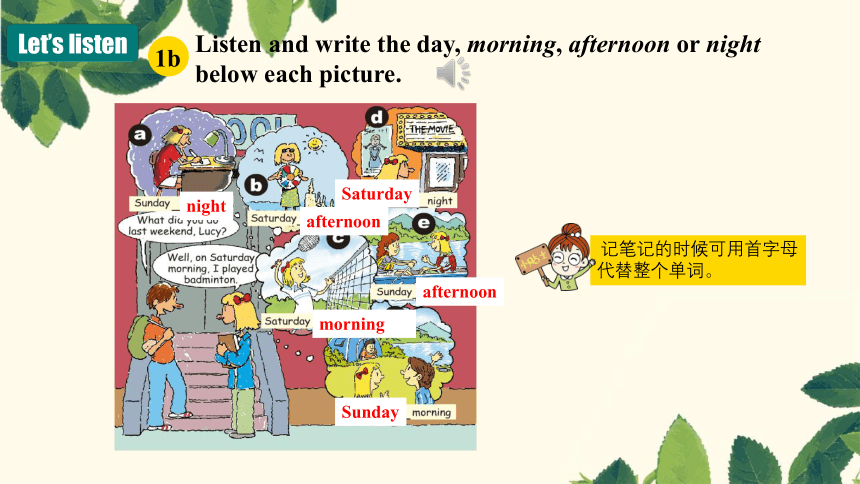
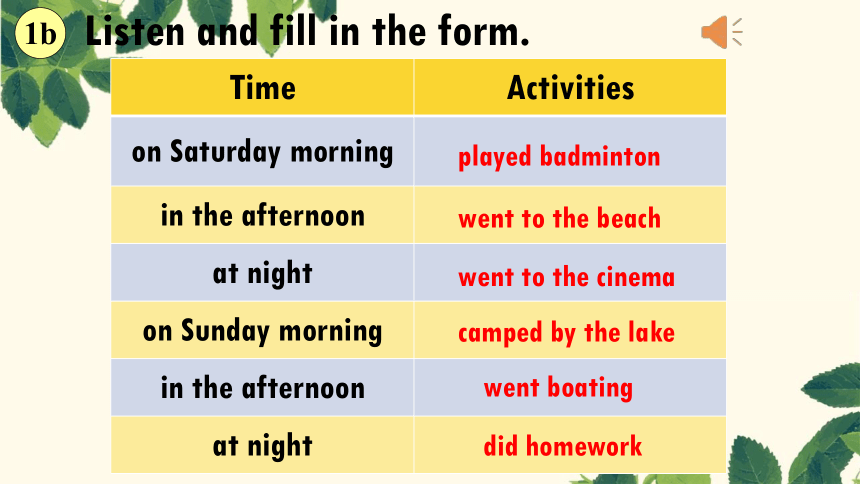
文档简介
(共30张PPT)
仓颉之初作书盖依类象形故谓之文其形声相益即谓之字文者物象之本字者言孳乳而浸多也著于竹帛谓之仓颉之初作书盖依类象形故谓之文其形声相益即谓之字文者物象之本字者言孳乳而
Unit 12 What did you do last weekend
第1课时(Section A 1a-1c)
Warming up
Sunday Sept. 20th It was Sunday yesterday, the weather _____ fine, and I had an exciting day. I ______ an art museum with my parents. There ______ many people at the museum. We _____ many beautiful paintings and art works at the museum. It _____ bright(明亮的) in it, we can see everything clearly, and I _____ a lot of photos. I also ______ a lot of gifts. I liked them vey much.
Can you help Lisa finish her diary entry
was
went to
were
saw
was
took
bought
Warming up
Let's enjoy the video !
What are they talking about
I cleaned my room on Saturaday morning.
I did sports on Saturday afternoon.
Free talk !
What did you do last weekend
Pre-listening
What did she/he do last weekend
did her homework
went to the cinema
went boating
camped by the lake
/le k/n. 湖;湖泊
went to the beach
played badminton
/bi t / n. 海滩;沙滩
/ b dm nt n/ n. 羽毛球运动
动词原形
动词过去式
Past过去
Present现在
do one's homework
go to the cinema
go boating
go to the beach
camp by the lake
play badminton
visit one's grandparents
study for a test
did one's homework
went to the cinema
went boating
went to the beach
camped by the lake
played badminton
visited one's grandparents
studied for a test
不规则变化
规则变化
go to the cinema
go to the beach
camp by the lake
go boating
play badminton
do one’s homework
Pre-listening
Say the past tense form of these expressions.
Match the activities with the pictures [a-f].
1a
1. did my homework __
2. went to the cinema __
3. went boating __
4. camped by the lake __
5. went to the beach __
6. played badminton __
f
a
e
b
d
c
look at the pictures and fill the sentences
1a
Look at picture a,she ___________.
Look at picture b,she ___________.
Look at picture c,she ___________.
did her homework
went to the beach
played badminton
look at the pictures and fill the sentences.
1a
Look at picture d,she ___________.
Look at picture e,she ___________.
Look at picture f,she ___________.
went to the cinema
went boating
camped by the lake
Let’s listen
Listen and write the day, morning, afternoon or night below each picture.
1b
记笔记的时候可用首字母代替整个单词。
morning
afternoon
Saturday
Sunday
night
afternoon
1b
Listen and fill in the form.
Time Activities
on Saturday morning
in the afternoon
at night
on Sunday morning
in the afternoon
at night
played badminton
went to the beach
went to the cinema
camped by the lake
went boating
did homework
1b
on __________,she played badminton.
Saturday morning
on __________,she went to the beach.
Saturday afternoon
on __________,she went to the cinema.
Saturday night
listen and try to finish the sentences.
listen and try to finish the sentences.
1b
on __________,she camped by the lake.
Sunday morning
on __________,she went boating.
Sunday afternoon
on __________,she did her homework.
Sunday night
read the sentences.
1b
on __________,she camped by the lake.
Sunday morning
on __________,she went boating.
Sunday afternoon
on __________,she did her homework.
Sunday night
on __________,she played badminton.
Saturday morning
on __________,she went to the beach.
Saturday afternoon
on __________,she went to the cinema.
Saturday night
Bob: Hey, Lucy. _____ was you weekend
Lucy: Hi, Bob. It was great.
Bob: So, what _____ you _____
Lucy: Well, ___ Saturday morning, I _______ badminton. In the afternoon I ______ the beach, and at night, I _______ __________.
Bob: Cool. What about Sunday
Lucy: In the morning, I ________ by the lake with my classmates. In the afternoon, we ___________, and at night, I _______________.
Try to finish the conversation.
How
did
do
on
played
went to
the cinema
went to
camped
went boating
did my homework
1b
let's read together
Bob: Hey, Lucy.
Lucy: Hi, Bob.
Bob: How was your weekend
Lucy: It was great.
Bob: So, what did you do
Lucy: Well, on Saturday morning, I played badminton.
In the afternoon, I went to the beach,
and at night, I went to the cinema.
Bob: Cool. What about Sunday
Lucy: In the morning, I camped by the lake with my classmates.
In the afternoon, we went boating,
and at night, I did my homework.
Role-play
played badminton
went to the beach
went to the cinema
Role-play. Student A is Lucy. Student B asks Lucy about her weekend.
What did you do last weekend, Lucy
Well, on Saturday morning, I played badminton. In the afternoon I went to the beach, and at night, I went to the cinema.
1c
Role-play
Role-play. Student A is Lucy. Student B asks Lucy about her weekend.
Cool . What about Sunday
In the morning, I camped by the lake with my classmates.
In the afternoon, we went boating, and at night, I did my homework.
1c
camped by the lake
went boating
did my homework
Let’s talk
What did Lucy do last weekend Describe Lucy’s weekend like this.
On Saturday morning, she played badminton, in the afternoon…
Language points
1. camped by the lake 在湖边野营
camp v. 扎营;搭帐篷
camp在此处作不及物动词,go camping意为“去野营”,camp out意为“露宿”。
Would you like to go camping with me
你想和我一起去野营吗?
【拓展】
camp也可作名词,意为“营地;度假营”。summer camp“夏令营”。
Did you go to the summer camp last year
去年你参加夏令营了吗?
2. -What did you do last weekend, Lucy 露西,上个周末你做什么了
-Well, on Saturday morning, I played badminton.哦,在周六上午我打羽毛球了。
1)问句是一个含有一 般过去时的特殊疑问句, 其中的助动词did是do的过去式。
在英语中,句子的动作发生在现在以前,即过去的时间,句子要用一般过去时。一般过去时中谓语动词要用过去式,如: do的过去式是did; go的过去式是went; am,is的过去式是was; are 的过去式是were.
-What did you do yesterday
昨天你做什么了
-| went to the hospital.
我去医院了
句子中用了助动词did时,后面的动词要用原形。
2)last weekend意为“上个周末"。weekend为名词,意为“周末”,通常指星期六和星期天两天。其对应词为weekday,即“工作日”,通常指从星期一至星期五的时间。
on weekends在周末 on weekdays在工作
当"last/next/this/that+ 时间”在句中作时间状语时,其前通常不再用介词。
He went to the beach last Sunday.
上个星期天他去海滩了。
3)play badminton意为”打羽毛球”。play与球类名词连用,表示.”....球,踢.... .球”时,球类名词前不加任何冠词。
play volleyball打排球 play football踢足球
play table tennis打乒兵球 play basketball打篮球
3.I fed some (sheep/cows). 我喂了一些 (绵羊/奶牛)。
sheep n. 羊;绵羊
sheep是可数名词,意为“羊;绵羊”,其复数形式仍然是sheep。
Sheep are eating grass in the fields.
羊在田野里吃草。
【巧学妙记】
单复数同形的可数名词
中日鱼羊鹿,是单也是复。
(注:中 — Chinese 日一Japanese
鱼一fish 羊一sheep
鹿一deer)
4.—Who visited her grandma 谁看望了她的奶奶?
— Becky did. 贝姬看望了(她的奶奶)。
do 代替上文的用法
在“Becky did.”中,did代替问句中的 visited her grandma。 英语中为了避免不必要的重复,经常用 do, does, did, so 等词来代替前面的动词(短语)或相关内容。
— Who broke the window 谁打破了窗户?
— Jack did. 杰克打破的。
代替broke the window
5. go boating 去划船
“go + V-ing形式”常用来表示从事某种活动。
go shopping 去购物 go camping 去野营 go boating 去划船 go fishing 去钓鱼
一、句型转换
1. Lucy did her homework at home. (改否定句)
Lucy _______ _______ her homework at home.
2. His father worked all day last Monday. (改一般疑问句)
______ his father ________ all day last Monday
3. I went to the movie last night. (对划线部分提问)
________ _______ ______ _____ _____ the movie
didn’t do
Did
work
When did you go to
4. I was very busy last week. (改否定句和一般疑问句)
I ________ very busy last week.
_____ you very busy last week
5. There was some orange in the cup. (变一般疑问句)
_____ there _____ orange in the cup
wasn’t
Were
Was
any
二、根据句意及所给汉语提示,写出所缺内容。
1. Alice likes ___________________________________ (打羽毛球) in her free time.
2. Lucy and Lily ________________(去海滩) yesterday.
3. Last night I _________________ (去了电影院) and saw a scary movie.
4. It’s not a good habit _______________(熬夜).
5. How about _____________________ (和我去划船) on Sunday
to play badminton / playing badminton
went to the beach
to stay up late
went to the cinema
going boating with me
仓颉之初作书盖依类象形故谓之文其形声相益即谓之字文者物象之本字者言孳乳而浸多也著于竹帛谓之仓颉之初作书盖依类象形故谓之文其形声相益即谓之字文者物象之本字者言孳乳而
谢君一赏
仓颉之初作书盖依类象形故谓之文其形声相益即谓之字文者物象之本字者言孳乳而浸多也著于竹帛谓之仓颉之初作书盖依类象形故谓之文其形声相益即谓之字文者物象之本字者言孳乳而
Unit 12 What did you do last weekend
第1课时(Section A 1a-1c)
Warming up
Sunday Sept. 20th It was Sunday yesterday, the weather _____ fine, and I had an exciting day. I ______ an art museum with my parents. There ______ many people at the museum. We _____ many beautiful paintings and art works at the museum. It _____ bright(明亮的) in it, we can see everything clearly, and I _____ a lot of photos. I also ______ a lot of gifts. I liked them vey much.
Can you help Lisa finish her diary entry
was
went to
were
saw
was
took
bought
Warming up
Let's enjoy the video !
What are they talking about
I cleaned my room on Saturaday morning.
I did sports on Saturday afternoon.
Free talk !
What did you do last weekend
Pre-listening
What did she/he do last weekend
did her homework
went to the cinema
went boating
camped by the lake
/le k/n. 湖;湖泊
went to the beach
played badminton
/bi t / n. 海滩;沙滩
/ b dm nt n/ n. 羽毛球运动
动词原形
动词过去式
Past过去
Present现在
do one's homework
go to the cinema
go boating
go to the beach
camp by the lake
play badminton
visit one's grandparents
study for a test
did one's homework
went to the cinema
went boating
went to the beach
camped by the lake
played badminton
visited one's grandparents
studied for a test
不规则变化
规则变化
go to the cinema
go to the beach
camp by the lake
go boating
play badminton
do one’s homework
Pre-listening
Say the past tense form of these expressions.
Match the activities with the pictures [a-f].
1a
1. did my homework __
2. went to the cinema __
3. went boating __
4. camped by the lake __
5. went to the beach __
6. played badminton __
f
a
e
b
d
c
look at the pictures and fill the sentences
1a
Look at picture a,she ___________.
Look at picture b,she ___________.
Look at picture c,she ___________.
did her homework
went to the beach
played badminton
look at the pictures and fill the sentences.
1a
Look at picture d,she ___________.
Look at picture e,she ___________.
Look at picture f,she ___________.
went to the cinema
went boating
camped by the lake
Let’s listen
Listen and write the day, morning, afternoon or night below each picture.
1b
记笔记的时候可用首字母代替整个单词。
morning
afternoon
Saturday
Sunday
night
afternoon
1b
Listen and fill in the form.
Time Activities
on Saturday morning
in the afternoon
at night
on Sunday morning
in the afternoon
at night
played badminton
went to the beach
went to the cinema
camped by the lake
went boating
did homework
1b
on __________,she played badminton.
Saturday morning
on __________,she went to the beach.
Saturday afternoon
on __________,she went to the cinema.
Saturday night
listen and try to finish the sentences.
listen and try to finish the sentences.
1b
on __________,she camped by the lake.
Sunday morning
on __________,she went boating.
Sunday afternoon
on __________,she did her homework.
Sunday night
read the sentences.
1b
on __________,she camped by the lake.
Sunday morning
on __________,she went boating.
Sunday afternoon
on __________,she did her homework.
Sunday night
on __________,she played badminton.
Saturday morning
on __________,she went to the beach.
Saturday afternoon
on __________,she went to the cinema.
Saturday night
Bob: Hey, Lucy. _____ was you weekend
Lucy: Hi, Bob. It was great.
Bob: So, what _____ you _____
Lucy: Well, ___ Saturday morning, I _______ badminton. In the afternoon I ______ the beach, and at night, I _______ __________.
Bob: Cool. What about Sunday
Lucy: In the morning, I ________ by the lake with my classmates. In the afternoon, we ___________, and at night, I _______________.
Try to finish the conversation.
How
did
do
on
played
went to
the cinema
went to
camped
went boating
did my homework
1b
let's read together
Bob: Hey, Lucy.
Lucy: Hi, Bob.
Bob: How was your weekend
Lucy: It was great.
Bob: So, what did you do
Lucy: Well, on Saturday morning, I played badminton.
In the afternoon, I went to the beach,
and at night, I went to the cinema.
Bob: Cool. What about Sunday
Lucy: In the morning, I camped by the lake with my classmates.
In the afternoon, we went boating,
and at night, I did my homework.
Role-play
played badminton
went to the beach
went to the cinema
Role-play. Student A is Lucy. Student B asks Lucy about her weekend.
What did you do last weekend, Lucy
Well, on Saturday morning, I played badminton. In the afternoon I went to the beach, and at night, I went to the cinema.
1c
Role-play
Role-play. Student A is Lucy. Student B asks Lucy about her weekend.
Cool . What about Sunday
In the morning, I camped by the lake with my classmates.
In the afternoon, we went boating, and at night, I did my homework.
1c
camped by the lake
went boating
did my homework
Let’s talk
What did Lucy do last weekend Describe Lucy’s weekend like this.
On Saturday morning, she played badminton, in the afternoon…
Language points
1. camped by the lake 在湖边野营
camp v. 扎营;搭帐篷
camp在此处作不及物动词,go camping意为“去野营”,camp out意为“露宿”。
Would you like to go camping with me
你想和我一起去野营吗?
【拓展】
camp也可作名词,意为“营地;度假营”。summer camp“夏令营”。
Did you go to the summer camp last year
去年你参加夏令营了吗?
2. -What did you do last weekend, Lucy 露西,上个周末你做什么了
-Well, on Saturday morning, I played badminton.哦,在周六上午我打羽毛球了。
1)问句是一个含有一 般过去时的特殊疑问句, 其中的助动词did是do的过去式。
在英语中,句子的动作发生在现在以前,即过去的时间,句子要用一般过去时。一般过去时中谓语动词要用过去式,如: do的过去式是did; go的过去式是went; am,is的过去式是was; are 的过去式是were.
-What did you do yesterday
昨天你做什么了
-| went to the hospital.
我去医院了
句子中用了助动词did时,后面的动词要用原形。
2)last weekend意为“上个周末"。weekend为名词,意为“周末”,通常指星期六和星期天两天。其对应词为weekday,即“工作日”,通常指从星期一至星期五的时间。
on weekends在周末 on weekdays在工作
当"last/next/this/that+ 时间”在句中作时间状语时,其前通常不再用介词。
He went to the beach last Sunday.
上个星期天他去海滩了。
3)play badminton意为”打羽毛球”。play与球类名词连用,表示.”....球,踢.... .球”时,球类名词前不加任何冠词。
play volleyball打排球 play football踢足球
play table tennis打乒兵球 play basketball打篮球
3.I fed some (sheep/cows). 我喂了一些 (绵羊/奶牛)。
sheep n. 羊;绵羊
sheep是可数名词,意为“羊;绵羊”,其复数形式仍然是sheep。
Sheep are eating grass in the fields.
羊在田野里吃草。
【巧学妙记】
单复数同形的可数名词
中日鱼羊鹿,是单也是复。
(注:中 — Chinese 日一Japanese
鱼一fish 羊一sheep
鹿一deer)
4.—Who visited her grandma 谁看望了她的奶奶?
— Becky did. 贝姬看望了(她的奶奶)。
do 代替上文的用法
在“Becky did.”中,did代替问句中的 visited her grandma。 英语中为了避免不必要的重复,经常用 do, does, did, so 等词来代替前面的动词(短语)或相关内容。
— Who broke the window 谁打破了窗户?
— Jack did. 杰克打破的。
代替broke the window
5. go boating 去划船
“go + V-ing形式”常用来表示从事某种活动。
go shopping 去购物 go camping 去野营 go boating 去划船 go fishing 去钓鱼
一、句型转换
1. Lucy did her homework at home. (改否定句)
Lucy _______ _______ her homework at home.
2. His father worked all day last Monday. (改一般疑问句)
______ his father ________ all day last Monday
3. I went to the movie last night. (对划线部分提问)
________ _______ ______ _____ _____ the movie
didn’t do
Did
work
When did you go to
4. I was very busy last week. (改否定句和一般疑问句)
I ________ very busy last week.
_____ you very busy last week
5. There was some orange in the cup. (变一般疑问句)
_____ there _____ orange in the cup
wasn’t
Were
Was
any
二、根据句意及所给汉语提示,写出所缺内容。
1. Alice likes ___________________________________ (打羽毛球) in her free time.
2. Lucy and Lily ________________(去海滩) yesterday.
3. Last night I _________________ (去了电影院) and saw a scary movie.
4. It’s not a good habit _______________(熬夜).
5. How about _____________________ (和我去划船) on Sunday
to play badminton / playing badminton
went to the beach
to stay up late
went to the cinema
going boating with me
仓颉之初作书盖依类象形故谓之文其形声相益即谓之字文者物象之本字者言孳乳而浸多也著于竹帛谓之仓颉之初作书盖依类象形故谓之文其形声相益即谓之字文者物象之本字者言孳乳而
谢君一赏
同课章节目录
- Unit 1 Can you play the guitar?
- Section A
- Section B
- Unit 2 What time do you go to school?
- Section A
- Section B
- Unit 3 How do you get to school?
- Section A
- Section B
- Unit 4 Don't eat in class.
- Section A
- Section B
- Unit 5 Why do you like pandas?
- Section A
- Section B
- Unit 6 I'm watching TV.
- Section A
- Section B
- Review of Units 1-6
- Unit 7 It's raining!
- Section A
- Section B
- Unit 8 Is there a post office near here?
- Section A
- Section B
- Unit 9 What does he look like?
- Section A
- Section B
- Unit 10 I'd like some noodles.
- Section A
- Section B
- Unit 11 How was your school trip?
- Section A
- Section B
- Unit 12 What did you do last weekend?
- Section A
- Section B
